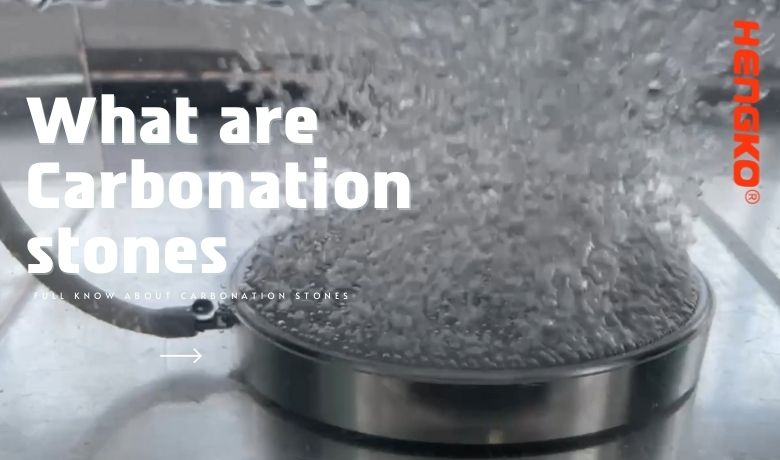What are Carbonation stones ?

What are Carbonation stones?
Carbonation stones, also known as diffusion stones, are a popular tool among homebrewers and commercial brewers for carbonating their beer. Carbonation stones are small, porous devices that add dissolved carbon dioxide to beer during fermentation. In this post, we'll take a closer look at carbonation stones, discussing how they work, the available types, and their benefits and drawbacks compared to other carbonation methods.
History of Carbonation stones
Carbonation stones, also known as carbonation diffusers or diffusion stones, introduce carbon dioxide (CO2) into a liquid, such as beer or soda. Carbonation stones are typically made from stainless steel or other non-reactive materials and have a porous surface through which the CO2 can be diffused into the liquid.
The history of carbonation stones can trace back to the invention of carbonated beverages. Carbonated water, or soda water, was first created in the 18th century by the English scientist Joseph Priestley. Priestley discovered that water could be "fixed" with CO2 by exposing it to the gas produced by fermenting beer. This process was later refined by other scientists and entrepreneurs, including Johann Jacob Schweppe, who founded the Schweppes company in 1783.
The first carbonated drinks were consumed mostly in pubs and soda fountains. Bottling and canning of carbonated drinks developed later with the industrial revolution making them more popular. Carbonation stones and other devices for carbonating liquids over time improve the efficiency and consistency of the carbonation process.
The brewing industry uses carbonation stones to carbonate beer in kegs or fermenters. The CO2 is diffused through the porous surface of the carbonation stone and into the beer. The stones are typically placed inside the keg or fermenter, and the CO2 is introduced under pressure, which causes it to dissolve into the liquid. The carbonation level can be controlled by adjusting the pressure and the amount of time the CO2 is in contact with the liquid.
Carbonation stones are still widely used in brewing and are a standard tool for carbonating beer, soda, and other carbonated beverages.
How Carbonation Stones Work
Carbonation stones allow a small, controlled release of carbon dioxide into the beer. The stone is placed in the fermenter, and a gas supply, such as compressed CO2, is connected. As the gas flows through the tiny pores of the stone, it dissolves into the beer. Because the pores are so small, the release of carbon dioxide is very slow and controlled, preventing over-carbonation and the formation of large bubbles.
Types of Carbonation Stones
There are two main carbonation stones available: ceramic and stainless steel. Ceramic stones are less expensive than stainless steel and are known for their durability and heat resistance. Stainless steel carbonation stones, on the other hand, offer a higher level of sanitation and are also more resistant to wear and tear. Both types of stones can be found in various sizes, depending on the fermenter's or keg's size.

Benefits and Drawbacks
Carbonation stones have several benefits compared to other carbonation methods, such as priming sugar or forced carbonation. For example, they allow for a more precise level of carbonation and better control over the size of the carbonation bubbles. They also allow for faster carbonation times, as the CO2 is injected directly into the beer. However, carbonation stones do have some drawbacks, including the potential for clogging and the need for regular cleaning and maintenance to ensure optimal performance.
Cleaning and Maintenance
Proper carbonation stone cleaning and maintenance are crucial for optimal performance and sanitation. It includes regular cleaning with a neutral detergent and sanitizing the stones before each use. It's also important to check the stones for signs of wear and tear, such as cracks or chips, and replace them if necessary.
Home and Commercial Use
Carbonation stones can be used in both commercial and home brewing operations. They are a great choice for homebrewers looking for a more precise and controlled carbonation method. They are also commonly used in commercial brewing operations as a reliable way to carbonate large batches of beer quickly and efficiently.
Recipes and Techniques
In addition to being a valuable tool for carbonating beer, carbonation stones can also be used to add unique flavors and aromas to the finished product. For example, some brewers use wood chips or fruits in the carbonation stone for extra flavor and aroma. Each carbonation stone will have a different surface area, changing how much flavor is imparted to the beer and how quickly it will carbonate.
Why Use Sintered Metal Carbonation Stone?
There are several reasons why a brewer might choose to use a Sintered metal carbonation stone:
1. Sanitation: Sintered metal carbonation stones, such as those made from stainless steel, are highly resistant to bacterial growth and much easier to clean and sanitize than other stones. It is particularly important for commercial brewers, who need to ensure their beer is safe for consumption.
2. Durability: Stainless steel is a very durable and long-lasting material, making it a great choice for carbonation stones that will be used regularly. The sintered metal carbonation stone is made by compressing powder of stainless steel under high pressure, making it much harder and resistant to wear and tear than other types of stones.
3. Temperature resistance: Stainless steel can withstand high temperatures without breaking down or becoming damaged, making it a good choice for carbonation stones used in high-temperature fermentation processes.
4. Consistency: Sintered metal carbonation stones have a consistent pore size, which ensures a consistent release of CO2. It makes it easier to achieve and maintain the desired carbonation level throughout the fermentation process.
5. High surface area: Sintered metal carbonation stones have a high surface area compared to other carbonation stones, which increases the carbonation rate and decreases the time it takes to carbonate the beer.
In summary, sintered metal carbonation stones, specifically those made from stainless steel, provide superior sanitation, durability, temperature resistance, consistency, and a high surface area. It is an ideal choice for commercial brewers, as well as for serious home brewers who are looking for a reliable and long-lasting carbonation solution.
Main Application of Carbonation stones in modern Industrial and Agricultural production
1. Carbonating beer in a keg: Carbonation stones are placed inside a keg of beer, and CO2 is introduced under pressure to dissolve into the beer, creating a carbonated beverage.
2. Carbonating soda in a fountain: Carbonation stones are used in soda fountains to add CO2 to the syrup and water mixture to create a carbonated drink.
3. Carbonating sparkling water: Carbonation stones produce sparkling water to dissolve CO2 into the water, creating bubbles and fizz.
4. Carbonating wine: Carbonation stones add CO2 to wine to create a sparkling wine.
5. Carbonating cocktails: Carbonation stones can be used to carbonate cocktails, adding bubbles and fizz to the drink.
6. Carbonating kombucha: Carbonation stones can add CO2 to kombucha to create a fizzy and effervescent drink.
7. Carbonating cider: Carbonation stones can be used to carbonate cider, adding bubbles and fizz to the drink.
8. Carbonating juice: Carbonation stones can add CO2 to juice to create a carbonated juice drink.
9. Carbonating tea: Carbonation stones can add CO2 to a carbonated tea drink.
10. Carbonating coffee: Carbonation stones can add CO2 to coffee to create a carbonated coffee drink.
11. Carbonating homemade soda: Carbonation stones can be used to carbonate homemade soda syrups, allowing you to make your carbonated beverages at home.
12. Carbonating in laboratory experiments: Carbonation stones are used for different scientific studies to carbonate liquids.
It is worth mentioning that carbonation stones are used for infusing CO2 into liquid. However, carbonation can also be achieved by other methods, such as pressurized tanks and bottles.
Conclusion
Carbonation stones are a valuable tool for any brewer looking to achieve a precise level of carbonation and control over the size of the carbonation bubbles. They are available in various sizes and materials, each with benefits and drawbacks. Proper cleaning and maintenance are essential for ensuring optimal performance and sanitation. With the right techniques, a carbonation stone can not only carbonate your beer but also add unique flavors and aromas to the finished product. It concludes our overview of carbonation stones and their use in brewing.
Create the perfect carbonated beverages with Carbonation stones from Hengko. Our high-quality diffusers are easy to use and perfect for any home or commercial application. Contact us today at ka@hengko.com for more information and to place your order!